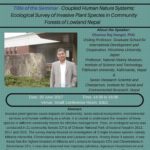(June. 20) The 111th TAOYAKA Program Seminar
The 111th TAOYAKA Program Seminar
The 111th TAOYAKA Program Seminar will be held with the 370th IDEC seminar and the 109th Study Session of Development and Cultural Change Forum. Everyone is welcome. We look forward to seeing you at the seminar.
■ Date: Tuesday, June 20, 2017
■ Time: 14:30 – 6:00PM
■ Venue: Small Conference Room, 1F Graduate School for International Development and Cooperation (IDEC), Hiroshima University
■ Title: Coupled Human Nature Systems: Ecological Survey of Invasive Plant Species in Community Forests of Lowland Nepal
■ Speaker: Dr. Dharma Raj Dangol, Visiting Professor, Graduate School for International Development and Cooperation, Hiroshima University, Japan; Professor, Natural History Museum, Institute of Science and Technology, Tribhuvan University, Kathmandu, Nepal; and Senior Research Scientist and Chairperson, Institute for Social and Environmental Research, Nepal.
Abstract:
Invasive plant species cause impacts on biodiversity, socio-natural ecosystems, environmental services and human wellbeing as a whole. It is crucial to understand the invasion of these species in different community forests for effective management. Thus, an ecological survey was conducted in 21 community forests (CFs) of Chitwan National Park of lowland Nepal in 2013, 2014 and 2015. The survey mainly focused on investigation of 3 major invasive species namely Mikania micrantha, Chromolaena odorata and Lantana camara. Among these 3 species, it was found that the highest invasion of Mikania and Lantana in Narayani CFs and Chromolaena in Barandavar CFs. It was also observed that Imperata cylindrica, Ageratum houstonianum and Clerodendrum infortunatum were the three most dominant understory species. The invasion of these species is increasing rapidly over the years impacts the human and wildlife ecosystems in the CFs. Further studies on management through utilization of these species for the livelihood improvement such as biogas, fodder and forages are necessary in future.






